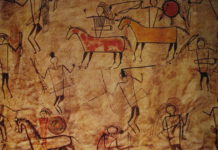Photo Credit: Global Diaspora News (www.GlobalDiasporaNews.com).
Israeli singer Eden Golan on Thursday secured a spot in the finals of the 2024 Eurovision Song Contest taking place in Malmö, Sweden, after more than 5,000 people protested earlier in the day about Israel’s participation in the competition.
Golan, 20, competed in Thursday’s second semi-final with a modified song, titled Hurricane. The original version was titled October Rain and referenced the deadly Hamas terrorist attacks on Oct. 7 in southern Israel. However, it was disqualified by the European Broadcasting Union (EBU), which organizes the Eurovision Song Contest, for breaking rules on political neutrality. Israel was forced to change the song’s title and lyrics if it wanted to participate in the contest.
Twenty-six contestants will compete in Saturday’s Eurovision finals. After Swedish singer Loreen won the competition last year with the song Tattoo, Sweden was given hosting duties for this year’s competition and automatically guaranteed a place in the Eurovision finals along with France, Germany, Italy, Spain, and the United Kingdom, which make the largest financial contributions to the song contest. The remaining 20 countries qualified for the finals after competing in the semi-finals on Tuesday and Thursday.
On Thursday, before Golan performed, roughly 5,000-6,000 anti-Israel demonstrators took to the streets in Malmö, and outside the singer’s hotel room, to protest Israel’s inclusion in the competition and the Jewish state’s ongoing military campaign targeting Hamas terrorists controlling the Gaza Strip. They changed “free, free Palestine” and some demonstrators held banners that read, “Welcome to Genocide song contest” and “stop using Eurovision to whitewash Israeli crimes.”
Swedish climate change activist Greta Thunberg was among the protesters and wore a keffiyeh draped across her shoulders. “It is outrageous that Israel is allowed to participate,” she said. “We cannot remain silent during a genocide.”
Golan, who reportedly received death threats for competing in the Eurovision, was ordered by Israel’s national security agency Shin Bet to stay in her hotel room during the anti-Israel demonstrations, except to attend her performances.
At a press conference after the semi-finals for those who were advancing to the next round, Polish journalist Szymon Stellmaszyk insinuated that Golan put others in danger by participating in the competition. Golan was visibly taken aback by the comment and told by the host of the press conference that she did not need to respond, but Dutch singer Joost Klein, who was sitting next to Golan on stage, interrupted and said, “Why not?” Golan ultimately chose to answer Stellmaszyk and said, “I think we’re all here for one reason and one reason only. And the EBU is taking all safety precautions to make this a safe and united place for everyone.” Greece’s representative in the Eurovision, Marina Satti, was later criticized on social media for her “immature” behavior on stage while Golan was speaking at the press conference.
The EBU more than once defended its decision to allow Israel to compete in the Eurovision Song Contest this year, explaining last week that the Eurovision is “a non-political music event” and “not a contest between governments.” The EBU also condemned the social media abuse and harassment that Eurovision contestants have faced for not pulling out of the competition as a way to boycott Israel’s participation. Anti-Israel activists unsuccessfully attempted for several months to convince artists to withdraw from the song contest.
At Tuesday’s semi-final, Eric Saade, whose father is Palestinian and from Lebanon, wore a keffiyeh around his wrist while performing his 2011 Eurovision entry Popular. The keffiyeh, a headscarf traditionally worn by Palestinians, has become known as a symbol of solidarity with Palestinian opposition to Israel. The EBU later said Saade compromised “the non-political nature of the event.”
Ireland’s entry, Bambie Thug, was also told to remove makeup from their face and legs that spelled out “ceasefire” and “freedom for Palestine” in a medieval Celtic script, according to The Irish Times.
An audience member who waved a Palestinian flag while Golan performed in the semi-finals on Thursday was removed from Malmö Arena by security.
Another Eurovision contestant, Finish singer Käärijä, received thousands of hateful comments after a video was posted online of him dancing with Golan to the point where he then took to his Instagram Story on Wednesday to explain his appearance with the Israeli singer.
Golan was booed by audience members during her dress rehearsal on Wednesday and shortly afterward, Israeli Prime Minister Benjamin Netanyahu released a video message in support of the singer.
“You’re competing not just in the Eurovision in a proud and very impressive manner, but you are competing successfully in the face of an ugly wave of antisemitism — and you are standing up to it and representing the State of Israel with huge honor,” he said.
In the 2023 Eurovision Song Contest, Israel’s representative, Noa Kirel, came in third place.
Watch Golan’s performance of Hurricane in the Eurovision semi-finals below.
עדן בביצוע בלתי נשכח pic.twitter.com/KabXoC1oHo
— כאן (@kann) May 9, 2024
Source of original article: Culture – Algemeiner.com (www.algemeiner.com).
The content of this article does not necessarily reflect the views or opinion of Global Diaspora News (www.GlobalDiasporaNews.com).
To submit your press release: (https://www.GlobalDiasporaNews.com/pr).
To advertise on Global Diaspora News: (www.GlobalDiasporaNews.com/ads).
Sign up to Global Diaspora News newsletter (https://www.GlobalDiasporaNews.com/newsletter/) to start receiving updates and opportunities directly in your email inbox for free.

































